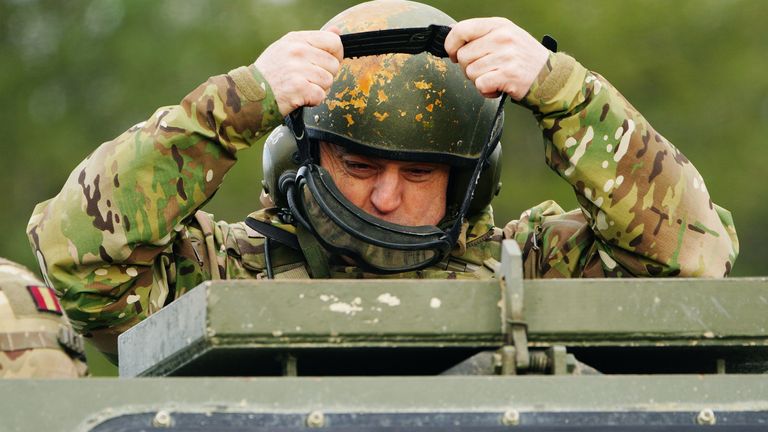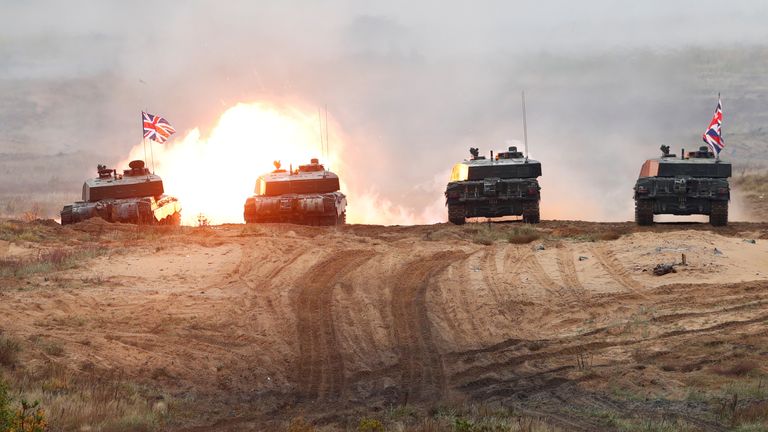The revised defence, security and foreign policy review will describe the Chinese Communist Party as an “epoch-defining challenge”. But the top priority will be to tackle the “fundamental risk” to European security posed by Moscow.
The UK will spend about an extra £5bn on its military and aim to lift defence spending to 2.5% of GDP as part of an updated strategy to counter intensifying threats from China and Russia.
The revised defence, security and foreign policy review will describe the Chinese Communist Party as an “epoch-defining challenge” in a toughening of language.
But the text will stop short of calling Beijing a state threat more broadly, other than to reaffirm that it poses the most serious state-based threat to UK economic security.
The top priority will be to tackle the “fundamental risk” to European security posed by Moscow and to deny President Vladimir Putin from benefitting from his invasion of Ukraine.
Prime Minister Rishi Sunak, speaking before his updated review is published on Monday, said the new money for defence over the next two years would replenish and grow ammunition stockpiles and top-up funding for the nuclear deterrent.
But the amount – while welcomed by the Ministry of Defence – is much less than what military chiefs are thought to require. Sources have told Sky News that the British Army alone needs an extra £3bn a year to avoid further cuts.
Mr Sunak, on a trip to the US, also failed to commit to a timeframe on when his ambition for defence expenditure to reach 2.5% of national income, up from just over 2%, would be achieved other than in the “longer term”.
He said: “The UK is increasing its ambitions when it comes to defence spending” and promised to review the figures after 2025.”
His 2023 Integrated Review Refresh will set out how the UK will respond to new threats and challenges posed by Moscow and Beijing since the original text was released two years ago.
The most significant changes in that period include the Ukraine war and increasingly aggressive military action by China around Taiwan.
UK adapts approach to China
Among the other announcements in the review will be:
•The creation of a new “National Protective Security Authority” within MI5 to give security advice to businesses to help counter threats such as from China
•Double funding for a so-called “China Capabilities programme” across government, including investing in Mandarin language training and diplomatic China expertise
•A new security fund worth £1bn to focus on economic and cyber security, countering terrorism as well as supporting human rights. It will replace what was known as the Conflict, Safety and Security Fund (CSSF)
•An additional £20m in funding for the BBC World Service, which broadcasts in countries that are targeted by hostile states with disinformation
A government statement said the refreshed review “sets out how the UK will adapt our approach on China to deal with the epoch-defining challenge presented by the Chinese Communist Party’s increasingly concerning military, financial and diplomatic activity…
“The prime minister has set the direction across government for a consistent, coherent and robust approach to China, rooted in the national interest and aligned with our allies.”
Mr Sunak is in San Diego for three-way talks with the US and Australian leaders as part of the AUKUS project to develop nuclear-powered submarines for the Australian navy.
But he insisted the programme was not purely in reaction to the rising “systemic challenge” from China.
The PM told Sky News: “This partnership represents something much bigger.
“We’re building the next generation of attack submarines with world-beating technology that we will be able to share with each other.
“Not just in the Pacific, but the Atlantic and around the world, it’ll improve security around the world and provide jobs.”
‘Indo-Pacific tilt’
A core part of the original text was what was described as an “Indo-Pacific tilt” – a policy that will be at the heart of a meeting in San Diego on Monday between Mr Sunak, US President Joe Biden and Australian Prime Minister Anthony Albanese.
The three leaders will flesh out details of a new collaboration on producing nuclear-powered submarines for the Australian navy.
The updated review will also reflect the “fundamental risk” to European security posed by President Putin’s war in Ukraine. Russia had already previously been described as “the most acute threat” to UK security in the 2021 Integrated Review.
The UK has played a leading role in supporting Ukraine with weapons and ammunition to fight Russia’s invading forces, including with tanks, anti-tank missiles and rocket launchers.
But the intensity of the conflict has exposed the inadequacy of UK ammunition stockpiles and also the capacity of the defence industry to produce more weapons fast enough.
It is a problem all NATO nations are dealing with, including the US.
Of the new money, £1.98bn will come over this financial year from April and £2.97bn will come over the following year.
Some £1.9bn will be spent on refilling and expanding ammunition stockpiles.

A new fleet of nuclear-armed submarines
One of the biggest drags on the budget, however, is a multi-billion-pound programme to build and arm a new fleet of nuclear-armed submarines that deliver the UK’s sea-based nuclear deterrence – the cornerstone of UK security policy.
As a result, the biggest chunk of the new cash – £3bn – will be invested in what is known as the “nuclear enterprise”, according to a government statement.
This will also contribute to the new AUKUS collaboration between Australia, the UK and the US.
Mr Sunak said: “As the world becomes more volatile and competition between states becomes more intense, the UK must be ready to stand our ground.”
The prime minister was pushed on what the timeframe would be to increase the defence budget to 2.5% of GDP. He signalled that it could be by 2030 but was not specific, though he did say that defence spending would reach 2.25% by 2025.

MoD could be unable to accelerate plans to fix gaps in military’s war-fighting capabilities
Without certainty about the rate at which defence spending will rise in the longer term, it could mean the Ministry of Defence is left unable to accelerate plans to fix certain gaps in the military’s war-fighting capabilities as fast as it would have liked.
This includes whether to reverse a cost-saving plan to shrink the army further to 73,000 soldiers from around 76,000 – something that many would like to see, but which can only happen credibly if more funding is made available, according to defence sources.
Labour leader Sir Keir Starmer welcomed the increase in defence spending, saying his party had long been calling for such a move.
But his shadow defence secretary, John Healey, also said the government was “failing to secure Britain’s national defence for the future”.
He added: “This announcement does not deal with capability gaps that weaken our national defence and undermine the UK’s NATO contribution.”
Source: Sky News


